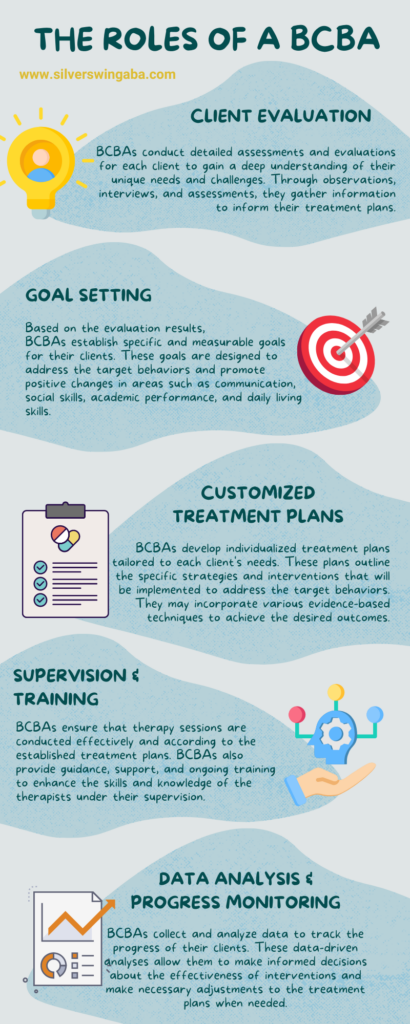The field of Applied Behavior Analysis (ABA) therapy heavily relies on the expertise of a board-certified behavior analyst (BCBA). A BCBA provides behavior-analytic services in various settings and works with a wide range of clients. Their expertise lies in conducting thorough assessments and evaluations to identify target behaviors and develop effective intervention plans.
The primary focus of a BCBA is to improve the quality of life for individuals by addressing behavioral challenges and promoting positive changes. While autism is a common disorder that behavior analysts treat, BCBAs also work with clients facing other social, physical, developmental, and emotional disorders.
Responsibilities of a BCBA
As highly trained professionals, BCBAs possess the skills and knowledge to provide comprehensive behavior analysis services. Their responsibilities include:

By fulfilling these responsibilities, BCBAs contribute significantly to the field of ABA therapy and help individuals achieve positive behavioral changes and improvements in their daily lives.
Becoming a BCBA
A Board Certified Behavior Analyst (BCBA) plays an important role in the field of ABA therapy. Becoming a BCBA requires a combination of education, supervised experience, and certification. Let’s explore the requirements in detail.
Educational Requirements
To embark on the path to becoming a BCBA, individuals must first earn a bachelor’s degree in a related field. Following this, they need to enroll in a graduate degree program in applied behavior analysis. The length of the program may vary depending on the educational institution. The coursework in these programs provides a comprehensive understanding of the principles and techniques of ABA therapy.

Supervised Experience
Gaining supervised experience is a vital component of becoming a BCBA. The Behavior Analyst Certification Board (BACB) requires individuals to complete a specified number of hours of supervised experience in ABA therapy. There are three types of supervised experience:
- Supervised Independent Fieldwork: This type of experience involves working with clients directly under the supervision of a qualified BCBA. It requires a minimum of 1,500 hours, with at least 75 hours of supervision.
- Practicum: Practicum experience involves supervised work in an approved ABA setting. It requires a minimum of 1,000 hours, with at least 50 hours of supervision.
- Intensive Practicum: Intensive practicum provides concentrated, supervised experience over a shorter duration. It requires a minimum of 750 hours, with at least 50 hours of supervision.
These supervised experiences offer invaluable hands-on training, allowing individuals to apply the principles and techniques they have learned in a real-world setting.

BCBA vs. ABA Therapist
It’s important to understand the distinctions between a Board Certified Behavior Analyst (BCBA) and an ABA therapist. While both play vital roles in providing effective treatment, their responsibilities and qualifications differ.
Distinctions
A BCBA, which stands for Board Certified Behavior Analyst, holds a higher level of certification and requires individuals to have a master’s degree and certification from the Behavior Analyst Certification Board. BCBAs are highly trained professionals who provide behavior analysis services and often supervise ABA therapists. They evaluate clients, create goals related to applied behavior analysis, and customize programs based on the client’s needs.
On the other hand, an ABA therapist, also known as a Board Certified Assistant Behavior Analyst (BCaBA), typically holds a bachelor’s degree and works under the supervision of BCBAs. Some ABA therapists may have a graduate degree as well. They spend more time working directly with clients on a day-to-day basis, implementing the treatment plans created by BCBAs.
Roles and Responsibilities
BCBAs and ABA therapists have distinct roles and responsibilities within the ABA therapy setting. BCBAs are responsible for conducting assessments and functional analyses to evaluate client behavior. Based on their findings, they develop individualized treatment plans and interventions using evidence-based techniques such as Discrete Trial Teaching (DTT) and the ABC model of behavior therapy.
Furthermore, BCBAs supervise ABA therapists, providing ongoing training and support. They closely monitor the progress of clients, make necessary adjustments to treatment plans, and ensure that the therapy is implemented effectively. BCBAs also collaborate with other professionals, such as teachers, parents, and caregivers, to ensure consistency in the implementation of behavior interventions across different environments.
ABA therapists, under the guidance of BCBAs, directly work with clients to implement the treatment plans. They collect data on client behavior, assist with skill acquisition, and provide behavior management strategies. ABA therapists play a crucial role in implementing behavior interventions and providing support to clients and their families. Their close interaction with clients allows for consistent and targeted therapy delivery.
By understanding the distinctions and roles of BCBAs and ABA therapists, individuals can better appreciate the collaborative effort required for effective ABA therapy. BCBAs provide the expertise and oversight, while ABA therapists implement the treatment plans and offer direct support to clients. Together, they work towards improving the lives of individuals with various social, physical, developmental, and emotional disorders.

ABA Therapy Effectiveness
ABA therapy has proven to be highly effective in addressing various behavioral challenges and improving the quality of life for individuals with different conditions. Let’s take a closer look at two specific areas where ABA therapy has shown significant effectiveness: the focus on Autism Spectrum Disorder (ASD) and language and communication improvement.
Focus on Autism Spectrum Disorder
Autism Spectrum Disorder (ASD) is the most common disorder that behavior analysts treat, and ABA therapy has become a widely recognized and evidence-based approach for individuals with ASD. ABA professionals study the problems that people with autism face and develop individualized treatment plans to help them improve their quality of life.
Through comprehensive assessments and targeted interventions, ABA therapists work with individuals with ASD to address various challenges they may experience. These challenges can include difficulties with social interactions, communication, repetitive behaviors, and sensory sensitivities.
Language and Communication Improvement
Language and communication deficits are common among individuals with ASD, and ABA therapy has shown particular effectiveness in addressing these areas. ABA therapists employ various methods and techniques specifically designed to enhance language development in individuals with ASD.
Verbal Behavior, Picture Communication Training (PCT), and Pivotal Response Training (PRT) are examples of approaches used in ABA therapy to improve language and communication skills. Verbal Behavior focuses on developing functional communication skills, such as requesting, labeling, and expressing needs. PCT utilizes visual supports, such as pictures and symbols, to aid in communication. PRT targets pivotal areas of development, such as motivation, responding to multiple cues, and self-management, to promote language growth.
By implementing these strategies and tailoring interventions to the unique needs of each individual, ABA therapists help individuals with ASD make significant progress in their language and communication abilities. This, in turn, enhances their overall social interactions and quality of life.

Career Outlook for BCBAs
As the field of ABA continues to grow, the career outlook for Board-Certified Behavior Analysts (BCBAs) remains positive. BCBAs play a crucial role in ABA therapy, providing expert guidance and support to individuals with behavioral challenges.
The demand for Applied Behavior Analysis therapists and BCBAs is on the rise, with an expected 18% growth from 2022 to 2032. The field of ABA has witnessed a significant surge in interest, leading to a rise in ABA educational program offerings and degree completions. In fact, between 2016 and 2020, there was a remarkable 113% increase in ABA program offerings in the United States, resulting in nearly a 250% growth in ABA degree completions.
With this increased interest in ABA therapy, the demand for BCBAs who possess specialized knowledge and expertise in behavior analysis is higher than ever. Professionals who have earned their BCBA credentials and hold a master’s degree are particularly sought after in the job market.
Conclusion
In summary, Board Certified Behavior Analysts (BCBAs) are integral to the success of Applied Behavior Analysis (ABA) therapy. Their expertise in assessment, program development, supervision, and training ensures that interventions are individualized, effective, and ethical. By working closely with individuals, families, and other professionals, BCBAs create supportive environments that foster significant and lasting improvements in behavior and skill development. Their comprehensive and compassionate approach is essential in helping individuals with autism and other developmental disorders achieve their fullest potential and improve their quality of life.
Sources:
- https://graduate.northeastern.edu/resources/what-is-a-board-certified-behavior-analyst/
- https://onlinecounselingprograms.com/mental-health-careers/how-to-become-behavior-analyst-bcba/
- https://www.abadegreeprograms.net/faq/what-is-the-difference-between-an-aba-and-a-bcba/
- https://www.indeed.com/career-advice/careers/what-does-a-bcba-do#:~:text=What%20does%20a%20BCBA%20do,emotional%2C%20social%20or%20behavioral%20issues.




